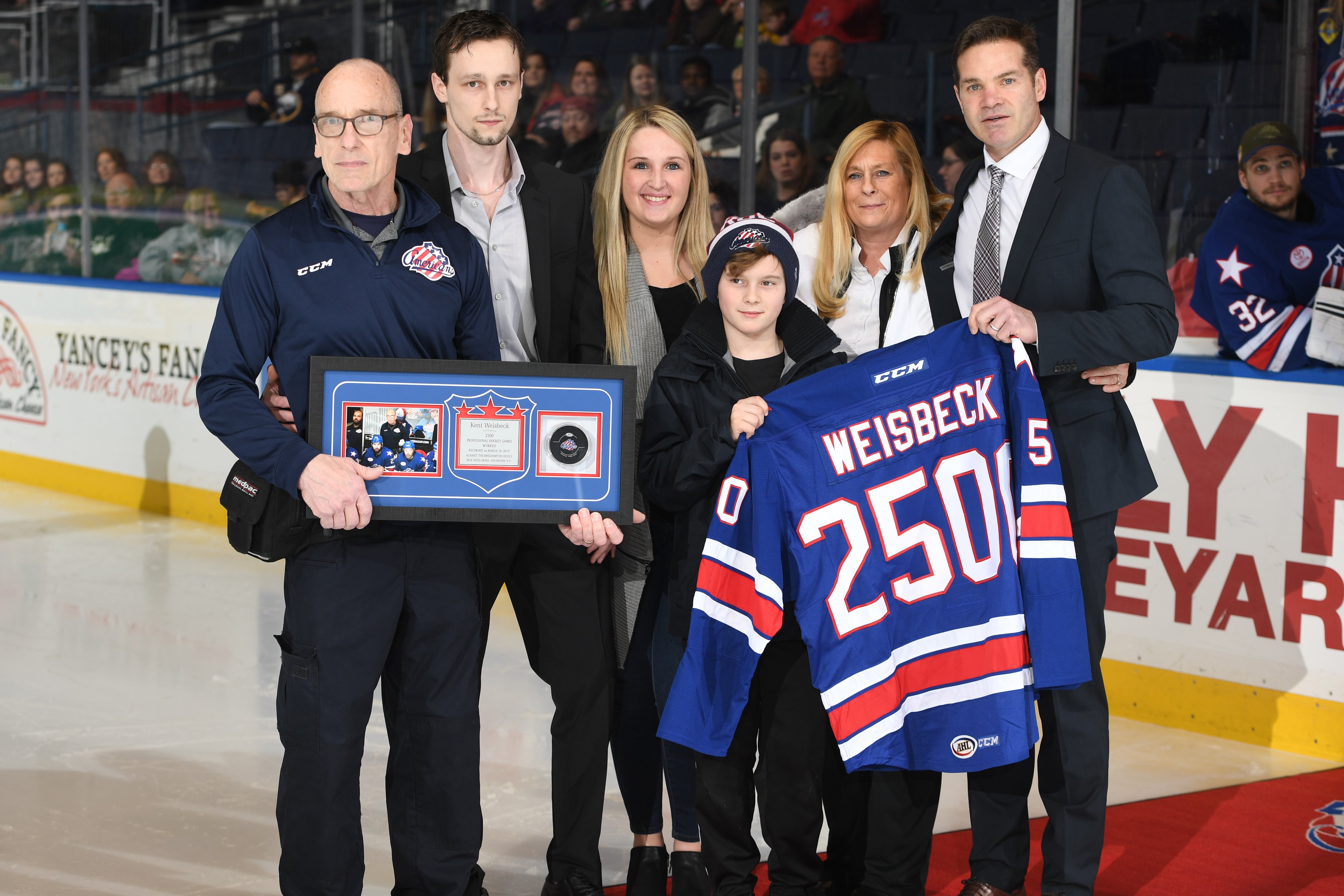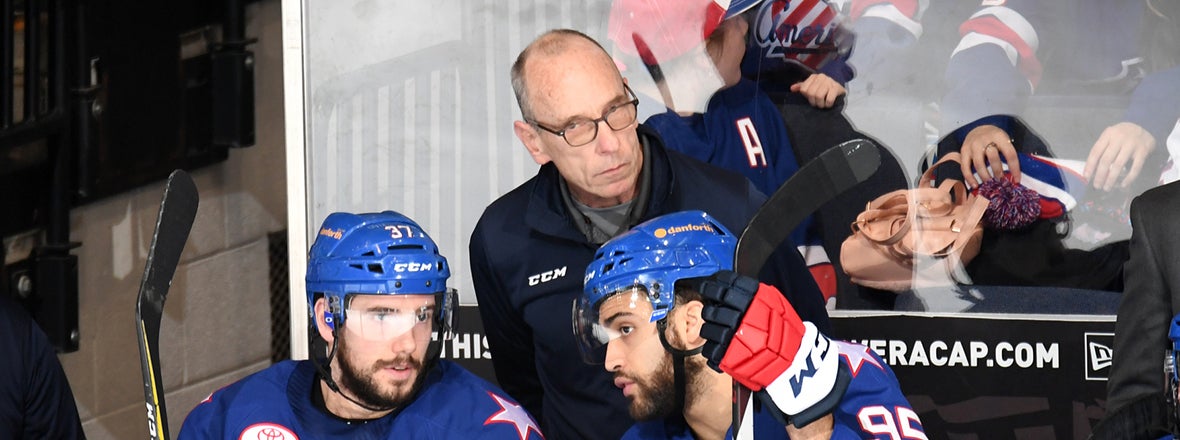
WEISBECK: “I’M JUST GLAD TO SAY I WORKED HERE”
The Amerks' longtime athletic trainer and Hall of Famer calls it a career after 39 seasons in Rochester
Sep 10, 2024![]() By Andrew Mossbrooks | @Mossbrooks48
By Andrew Mossbrooks | @Mossbrooks48
Kent Weisbeck has left the snack bar.
For the first time since the 1985-86 season, Rochester Americans players and staff alike will enter Blue Cross Arena to begin a new season without the beloved “Snacky” trotting through the hallways and locker room. The Amerks 2010 Hall of Fame inductee has retired after nearly four decades as an athletic trainer for the red, white, and blue.
“Kent was the ultimate pro,” said Amerks all-time leading scorer, Jody Gage.
“He was a diligent, hardworking, class act,” said former Amerks assistant coach, Jon Christiano.
“He was a real workhorse,” said Hall of Fame broadcaster, Don Stevens.
“You can’t think of the Rochester Americans without him,” uttered the team’s current athletic trainer, Michael Dhesse.
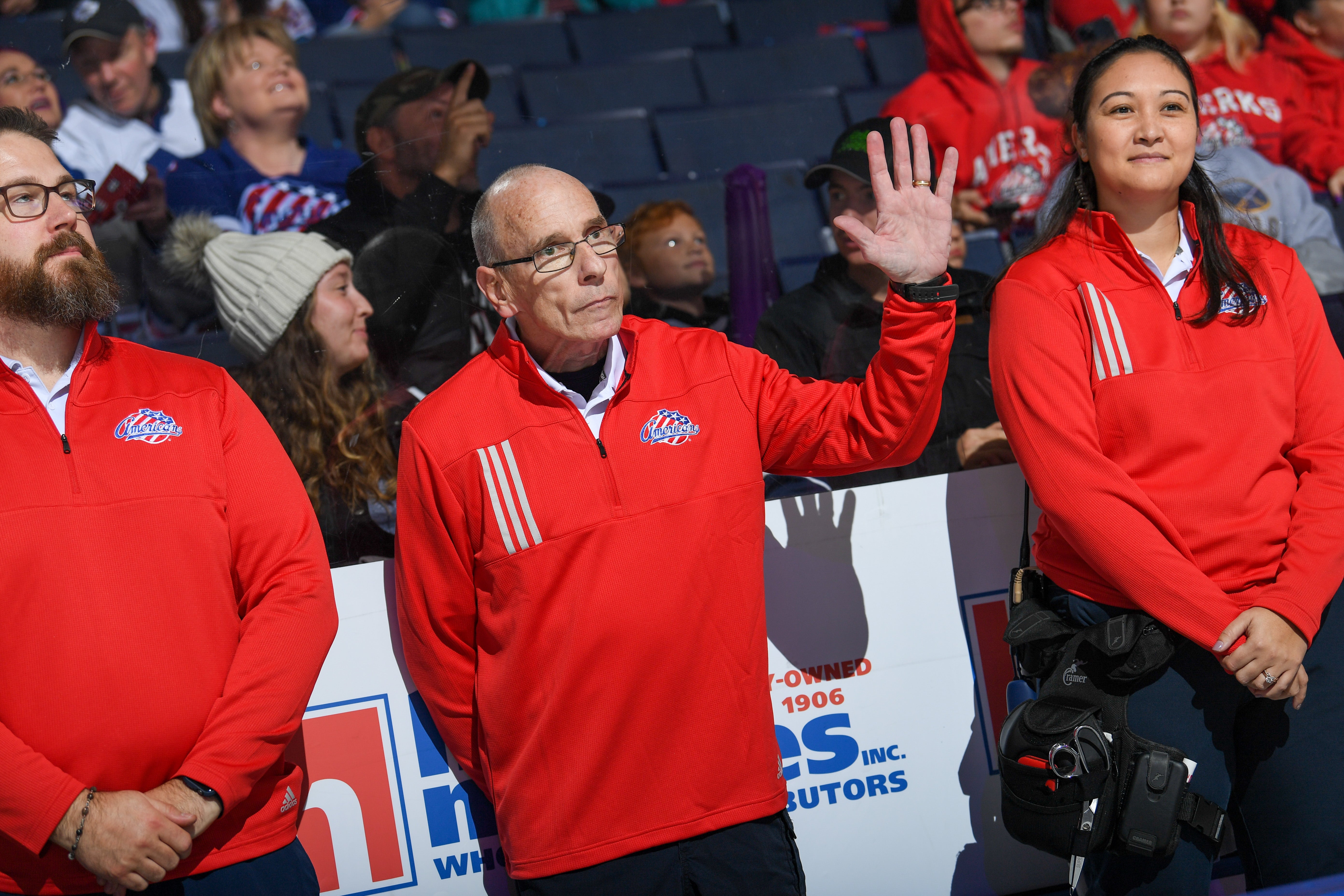
Weisbeck grew up an hour down the road in Buffalo. It was there where he graduated from the University of Buffalo in 1977 before going on to stay with his alma mater as an assistant athletic trainer.
“I was working three jobs before getting here,” said Weisbeck. “I was at the University of Buffalo as an assistant trainer, but all that was just a stipend pay, so I had to work at a fitness center in Williamsville, too. That’s where I heard about the opening in Rochester. I interviewed for the position and the rest is history.”
“The rest” ended up accounting for over 2,500 games behind the bench for Weisbeck, including a pair of championship-clinching contests in 1987 and 1996 as evidenced by his Calder Cup rings. He was a member of two Calder Cup winning Amerks teams and found his way in the finals seven times, yet asking someone within the organization about Kent Weisbeck may draw confused looks. For the bulk of his career, Weisbeck was simply referred to as “Snacky.”
“When we used to practice at Lakeshore rink, I would call the team doctors before practice when we got to the rink. Later, they would call me back when we were still at the rink and the call would come in over the loudspeaker saying ‘Kent Weisbeck, you have a phone call at the snack bar.’ Bobby Logan and Jeff Parker started calling me snack bar, and then it turned into snacky and snack man and all kinds of variations of that. I guess that’s how it stuck with me.”
Keep in mind, this is before cell phones were a thing.
“We used to hear ‘Kent Weisbeck to the snack bar’ and get excited,” said Gage. Those calls sometimes meant a guy was getting called-up to the NHL, so we got excited anytime Snacky went to the snack bar.”
Over time, Weisbeck accepted the name and embraced his role, but going from being an athletic trainer at the collegiate level to then making the jump to pro wasn’t a walk in the park.
“That first year was a learning experience,” said Weisbeck. “You have to do the right thing, even if that means keeping players off the ice for their health and safety. Injuries don’t stop players from wanting to play. You sort of have to play the role of bad cop, but you hope that you establish a relationship built on trust so the athletes know you are looking out for their best interest.”
And that trust was quickly built and earned when players and staff alike realized just how committed Snacky was to them.
“Personally, for me, he looked after me and took care of me when it came to all my injuries,” said Gage. “I remember the one time I got a bruised kidney in the playoffs. I was peeing blood and all of a sudden, he put me in a car, drove me to a hospital and stayed with me the whole time. That’s just how Kent was. He cared about all of his players. He’s a great man who knew his craft and worked really hard at it. He’s a Hall of Famer and by far the best trainer I ever had. The players loved him.”
“I don’t know where I’d be without him,” said Buffalo Sabres athletic trainer, Bob Mowry, who worked with the Amerks from 2015-19. “I appreciated not only our friendship, but his mentorship as well.”
“I always felt very confident when I knew my players were in his hands,” said Brian McCutcheon, who coached Rochester from 1997-00.
Weisbeck’s job required sacrifice and commitment beyond the norm. Never was he one to put himself before others.
“He was totally dedicated and in long before anybody else would come into the rink every day,” said Stevens. “He’d already be done with a workout and the newspaper before anybody walked in the door. I think back to the road trips, too. The busses were always so crowded, and I don’t know how many times Snacky ended up sitting on a cooler in the aisle because he didn’t want to make any of the players double up and have to share a row of seats.”
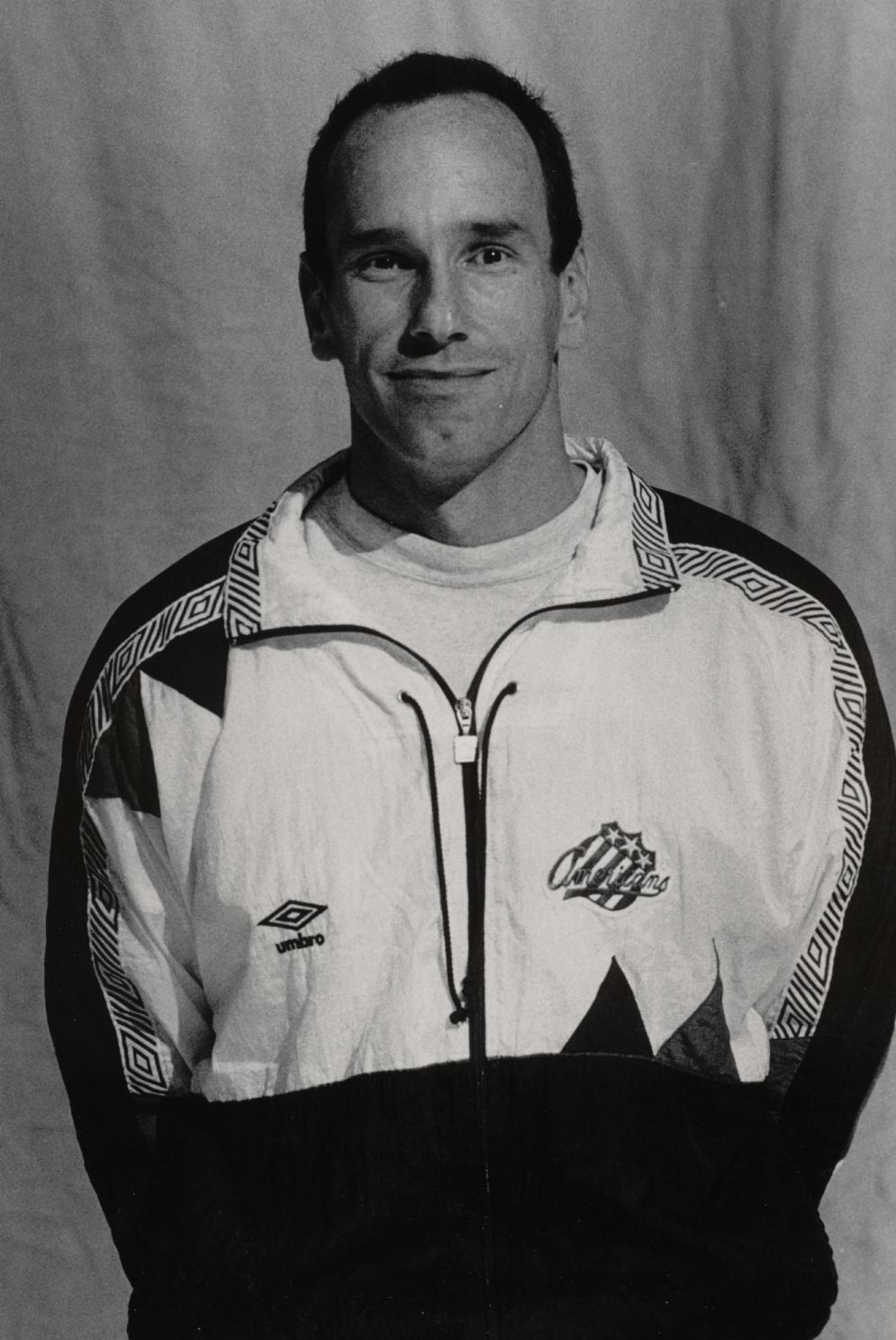 When he did have a seat, though, Snacky made sure to still claim rights to the cooler.
When he did have a seat, though, Snacky made sure to still claim rights to the cooler.
“We would sit on the bus together and across from each other and fight for the ice cooler to use to put our feet on to go to sleep,” laughed Weisbeck. “We’d be knocking each other’s legs off the cooler through the night. We had a great time together.”
Those bus rides were no joke then. The AHL had fewer teams and farther trips than the modern era.
“We used to play three games in three nights with the middle game somewhere far away and then had to be back Sunday afternoon for a game. We never flew. It was always by bus. We used to drive up to the Maritimes in Canada. 13-plus hour drives there and back.”
When asked about a good place to go to on the road, Weisbeck didn’t hesitate.
“I liked going to Hershey. I love the chocolate factory.”
Weisbeck’s miles on the road and hours in the room were recognized and rewarded in 2010, when he became the first athletic trainer and 48th member of the Rochester Americans Hall of Fame.
“Getting inducted into the Amerks Hall of Fame was a very good night, but I went back to work so I didn’t miss that game, so I jumped out of my suit back into my regular clothes to be behind the bench. I was just lucky to have my family there to be a part of it. I would miss them so much on the road. The AHL doesn’t stand for American Hockey League; it stands for Away from Home Lots. You spend more time with the team than you do your own family. They gave me a lot of support. I missed a lot of family events for work and thankfully they understood.”
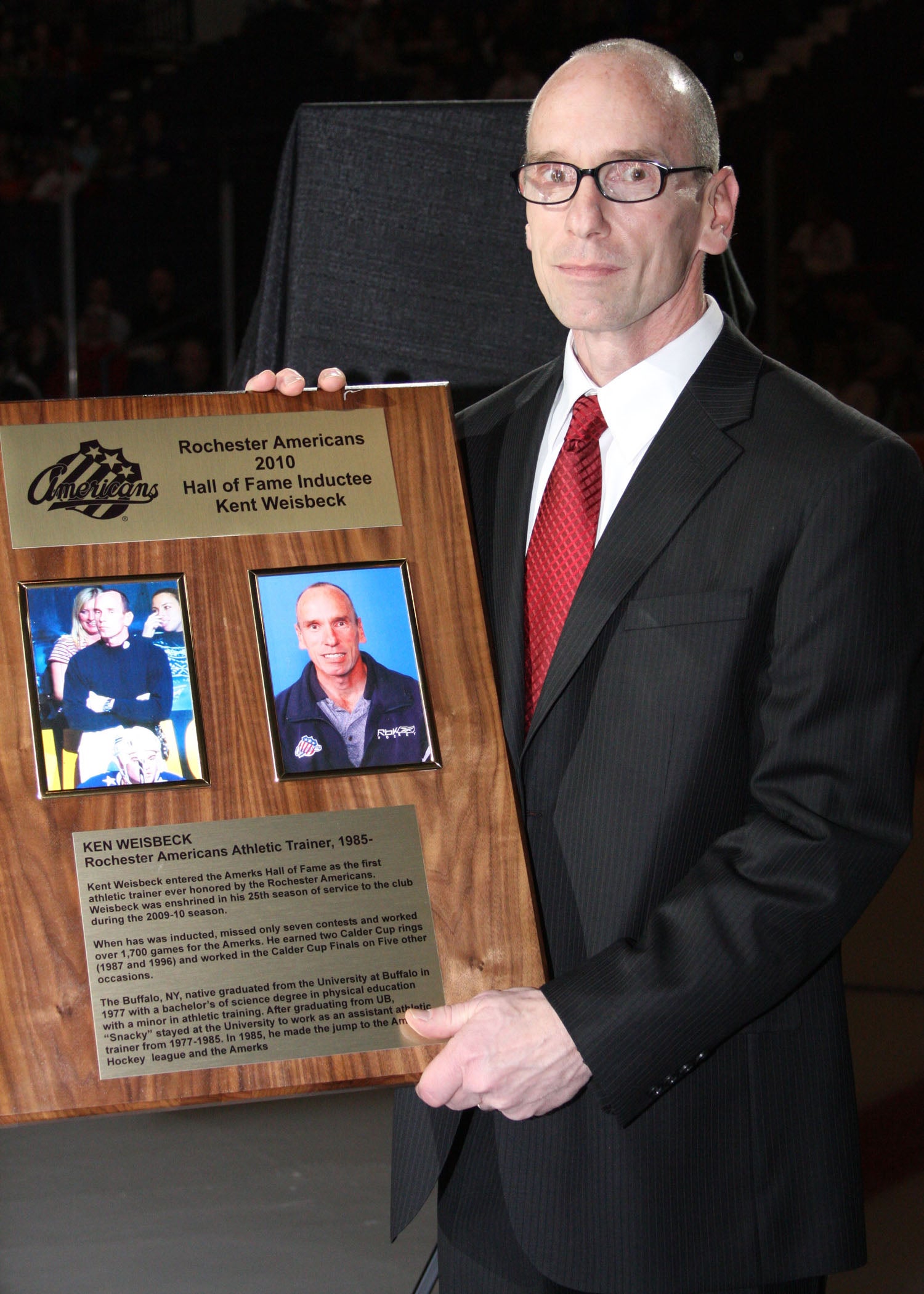
“He’d go through a wall for you, and I’d do the same for him.”
Snacky has always been about giving back and helping others. So much of his time has been focused on the players, but over the last several seasons, there’s been an extra emphasis for the Hall of Famer when it comes to the off-ice personnel, specifically his successor, Michael Dhesse.
“He’s done a great job here,” said Weisbeck on Dhesse’s time with the Amerks. “He came from the college route like me, so I kind of see a little bit of myself in him. I know what it’s like to come from a college setting and jumping to the pros.”
Dhesse hasn’t taken his first five years in the Flower City for granted, especially when being able to sit under the learning tree of Weisbeck.
“Snacks is always there to listen and give advice,” said Dhesse. “It’s really nice and always appreciated because the man has literally seen everything throughout his career. He has a calming presence and is a quiet guy, so our relationship was slowly built over time.”
Dhesse and Weisbeck were colleagues, but the two became friends and bonded over more than just hockey.
“I think our relationship really grew when I had my first kid. He was really there to talk me through stuff while trying to balance work and my personal life.”
“I think we as people and organizations get accustomed to the dependability of people like Snacks. By no means does anyone take for granted what he’s done for the organization, but you can’t think of running a clinic or having the Rochester Americans without him. Look around the league. Has anybody consistently been around the league in a singular position like this for this long? Snacks has meant a lot to this community and this organization.”
Saying goodbye to the Amerks isn’t easy for Weisbeck, but on his way out, he knows that he can look behind him and see a trainer he trusts with a bright future ahead.
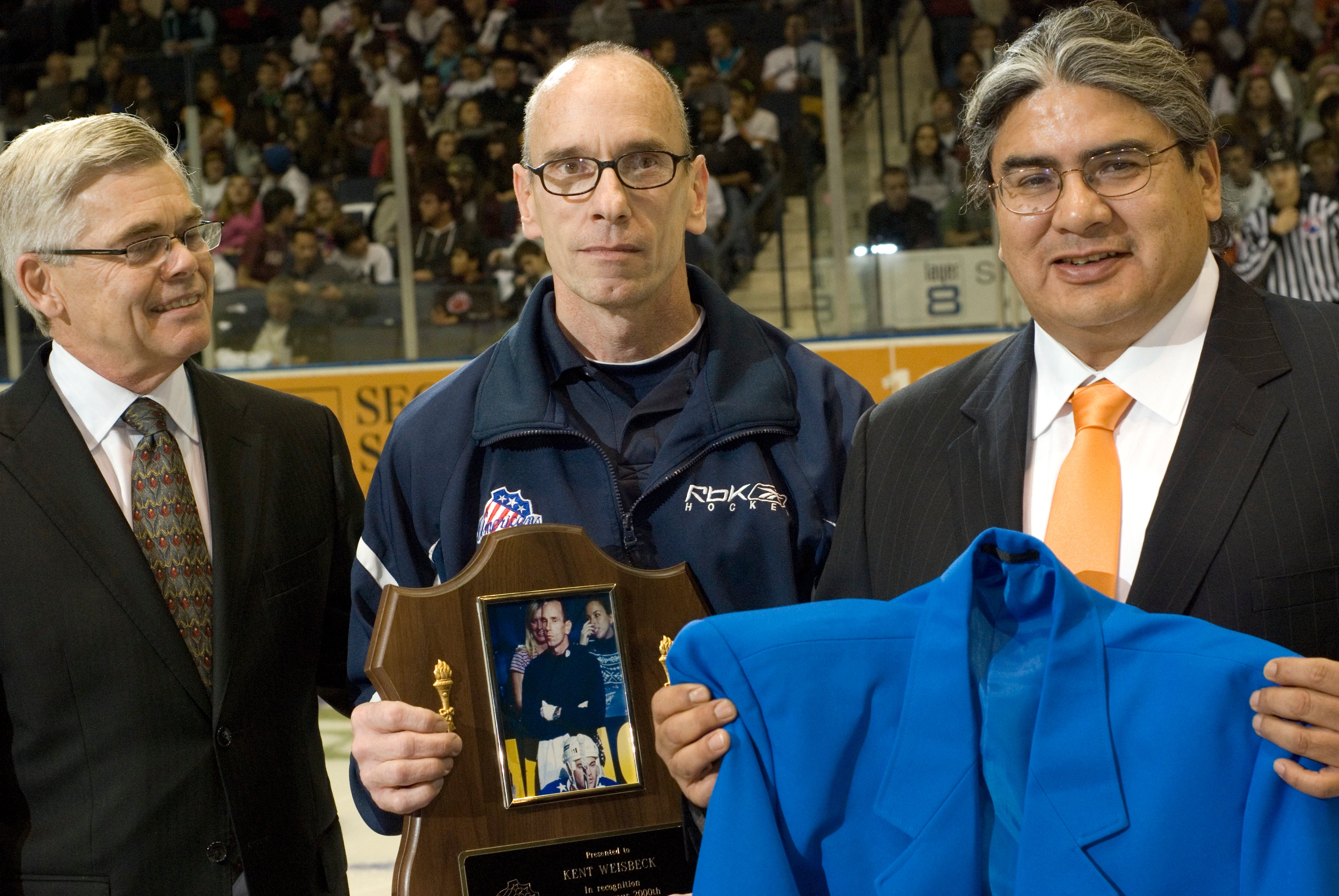
“He’s done a great job and he’s going to be a good athletic trainer for many years to come,” said Weisbeck on Dhesse. “I have nothing but good feelings about Michael and the work he’s done.”
“I’m really proud to be the head athletic trainer here so I can carry on his legacy,” said Dhesse. “What’s tough about the position is it’s not like he’s in the public eye. If people really understood the impact he has had on this organization over the years, their minds would be blown away. He’s done so much for the players to put them in the best possible positions for their careers and that’s a really cool thing.”
Words like legacy aren’t in Weisbeck’s vocabulary. As the book closes on a career that will be deservedly celebrated, Snacky’s career retrospective is simple and humble. That’s just the kind of person Kent Weisbeck is.
“I’m just glad to say I live in Rochester and worked here. To have spent 39 years of my life working one job is really something special. The camaraderie with the players, the coaching staff, and the front office staff has made this such a great place to work. The organization takes care of you and makes it easy to go to work every day.”


